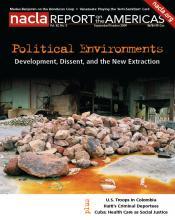
Conflicts over natural resources are on the rise in Latin America. In June, for example, at least 33 people were killed, including civilians and police, after shooting erupted at a road blockade set up near the Amazonian town of Bagua, Peru, to protest the government’s plans to ease private investment in the countryside. Such conflicts are likely to recur. Even with a global downturn in foreign investing, capital has been flowing steadily into the region’s growing mining and hydrocarbon sectors, as governments push the extraction agenda. Indeed, the presidential decrees that touched off the violence in Peru were “only the most brazen” expression of a new continent-wide push to open up frontiers to various extractive industries, as noted in this Report. As the articles in this issue make clear, conflicts in the region over natural resources occur in a variety of “political environments”—from neoliberal Peru to anti-neoliberal Bolivia. The aim of this Report is thus to showcase examples of natural resource conflicts in which development projects and environmentalism collide, in the context of the region’s “new extraction.”
